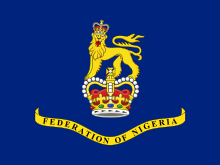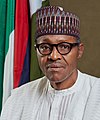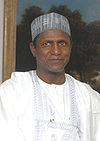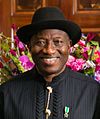List of heads of state of Nigeria
 |
|---|
|
|
This is a list of the heads of state of Nigeria, from Nigeria's independence in 1960 to the present day.
From 1960 to 1963 the head of state under the Nigeria Independence Act 1960 was the Queen of Nigeria, Elizabeth II, who was also monarch of the United Kingdom and the other Commonwealth realms. The Queen was represented in Nigeria by a Governor-General. Nigeria became a federal republic under the Constitution of 1963 and the monarch and Governor-General were replaced by a ceremonial President.
In 1979, under the 1979 Constitution, the President gained executive powers, becoming head of both state and government. Since 1994, under the 1993 Constitution and the current 1999 Constitution, the head of state and government has been called the President.[1]
Monarch (1960–1963)
The succession to the throne was the same as the succession to the British throne.
| Queen | Reign | Royal House | Prime Minister | ||||
|---|---|---|---|---|---|---|---|
| No. | Portrait | Name (Birth–Death) |
Start | End | Duration | ||
| 1 | 
|
Elizabeth II (born 1926) |
1 October 1960 | 1 October 1963 | 3 years | Windsor | Balewa |
Governor-General

The Governor-General was the representative of the monarch in Nigeria and exercised most of the powers of the monarch. The Governor-General was appointed for an indefinite term, serving at the pleasure of the monarch. Since Nigeria was granted independence by the Nigeria Independence Act 1960, rather than being first established as a semi-autonomous Dominion and later promoted to independence by the Statute of Westminster 1931, the Governor-General was appointed solely on the advice of the Nigerian cabinet without the involvement of the British government, with the sole of exception of James Robertson, the former colonial governor, who served as Governor-General temporarily until he was replaced by Nnamdi Azikiwe. In the event of a vacancy the Chief Justice would have served as Officer Administering the Government.
| Governor-General | Term of office | Monarch | Prime Minister | |||
|---|---|---|---|---|---|---|
| No. | Name (Birth–Death) |
Took office | Left office | Time in office | ||
| 1 | Sir James Robertson (1899–1983) |
1 October 1960 | 16 November 1960 | 46 days | Elizabeth II | Abubakar Tafawa Balewa (1912–1966) |
| 2 | Nnamdi Azikiwe (1904–1996) |
16 November 1960 | 1 October 1963 | 2 years, 319 days | Elizabeth II | Abubakar Tafawa Balewa (1912–1966) |
First Republic (1963–1966)
Under the 1963 Constitution, the first constitution of the Republic of Nigeria, Nigeria ran the parliamentary system of government with a prime minister and the President replacing the monarch as ceremonial head of state. The Prime Minister was formed by the leader of the party that won the election. The first federal election was won by the Northern People's Congress led by Abubakar Tafawa Balewa. The President was elected by Parliament for a five-year term. In the event of a vacancy the President of the Senate would have served as Acting President.
| President | Term of office | Political party | Prime Minister | |||
|---|---|---|---|---|---|---|
| No. | Name (Birth–Death) |
Took office | Left office | Time in office | ||
| 1 | Nnamdi Azikiwe (1904–1996) |
1 October 1963 | 16 January 1966 | 2 years, 107 days | National Council of Nigeria and the Cameroons | Abubakar Tafawa Balewa (1912–1966) |
Military rule (1966–1979)
In 1966, Major Chukwuma Kaduna Nzeogwu led a bloody coup d'état in 1966 which overthrew the First Nigerian Republic, assassinating Premier Ahmadu Bello and Prime Minister Abubakar Tafawa Balewa.
| Head of state | Term of office | Military | ||||
|---|---|---|---|---|---|---|
| No. | Portrait | Name (Birth–Death) |
Took office | Left office | Time in office | |
| style="background:Template:Military rule/meta/color; color:black;" |2 | Major-General Johnson Aguiyi-Ironsi (1924–1966) |
16 January 1966 | 29 July 1966 (assassinated.) |
194 days | Federal Military Government | |
| style="background:Template:Military rule/meta/color; color:black;" |3 | 
|
General Yakubu Gowon (born 1934) |
1 August 1966 | 29 July 1975 (deposed.) |
8 years, 362 days | Federal Military Government |
| style="background:Template:Military rule/meta/color; color:black;" |4 | General Murtala Mohammed (1938–1976) |
29 July 1975 | 13 February 1976 (assassinated.) |
199 days | Federal Military Government | |
| style="background:Template:Military rule/meta/color; color:black;" |5 | 
|
Major-General Olusegun Obasanjo (born 1937) |
13 February 1976 | 1 October 1979 (resigned.) |
3 years, 258 days | Federal Military Government |
Second Republic (1979–1983)
Under the 1979 Constitution, the second constitution of the Republic of Nigeria, the President was head of both state and government. The President was elected by for a four-year term. In the event of a vacancy the Vice President would have served as Acting President.
| President | Elected | Term of office | Political party | ||||
|---|---|---|---|---|---|---|---|
| No. | Portrait | Name (Birth–Death) |
Took office | Left office | Time in office | ||
| 6 | 
|
Shehu Shagari (1925–2018) |
1979 1983 |
1 October 1979 | 31 December 1983 (deposed.) |
4 years, 91 days | National Party of Nigeria |
Military rule (1983–1993)
Major-General Muhammadu Buhari led a coup d'état which overthrew President Shagari and his government.
| Head of state | Term of office | Military | ||||
|---|---|---|---|---|---|---|
| No. | Portrait | Name (Birth–Death) |
Took office | Left office | Time in office | |
| style="background:Template:Military rule/meta/color; color:black;" |7 | 
|
Major-General Muhammadu Buhari (born 1942) |
31 December 1983 | 27 August 1985 (deposed.) |
1 year, 239 days | Supreme Military Council |
| style="background:Template:Military rule/meta/color; color:black;" |8 | File:GENERAL IBRAHIM BADAMASI BABANGIDA.jpg | General Ibrahim Babangida (born 1941) |
27 August 1985 | 26 August 1993 (resigned.) |
7 years, 364 days | Armed Forces Ruling Council |
Interim National Government (1993)
Following the annulment of the 1993 Nigerian presidential election which terminated the transition to the Third Nigerian Republic. In August 1993, Babangida resigned from office. He signed a decree establishing the Interim National Government led by Ernest Shonekan. Babangida made the interim government weak by placing it under the control of the military.
| President | Term of office | Political party (at time of start of term | |||
|---|---|---|---|---|---|
| No. | Name (Birth–Death) |
Took office | Left office | Time in office | |
| style="background:Template:Independent politician/meta/color; color:black;" |9 | Ernest Shonekan (born 1936) |
26 August 1993 | 17 November 1993 (deposed.) |
83 days | Independent |
Military rule (1993–1999)
In November 1993, General Sani Abacha overthrew the interim government, and ruled the country with an iron fist. In 1998, following Abacha's death, General Abdulsalami Abubakar became head of state and ushered in the Fourth Nigerian Republic.
| Head of state | Term of office | Military | ||||
|---|---|---|---|---|---|---|
| No. | Portrait | Name (Birth–Death) |
Took office | Left office | Time in office | |
| style="background:Template:Military rule/meta/color; color:black;" |10 | General Sani Abacha (1943–1998) |
17 November 1993 | 8 June 1998 (died in office.) |
4 years, 203 days | Provisional Ruling Council | |
| style="background:Template:Military rule/meta/color; color:black;" |11 | 
|
General Abdulsalami Abubakar (born 1942) |
8 June 1998 | 29 May 1999 (resigned.) |
355 days | Provisional Ruling Council |
Fourth Republic (1999–present)
Under the fourth Constitution of the Republic of Nigeria, the President is head of both state and government. The President is elected by for a four-year term. In the event of a vacancy the Vice President serves as Acting President.
- Status
| President | Elected | Term of office | Political party | ||||
|---|---|---|---|---|---|---|---|
| No. | Portrait | Name | Took office | Left office | Time in office | ||
| style="background:Template:People's Democratic Party (Nigeria)/meta/color; color:white;" |12 | 
|
Olusegun Obasanjo
(1937–) |
1999 2003 |
29 May 1999 | 29 May 2007 | 8 years | People's Democratic Party |
| style="background:Template:People's Democratic Party (Nigeria)/meta/color; color:white;" |13 | 
|
Umaru Musa Yar'Adua
(1951–2010) |
2007 | 29 May 2007 | 5 May 2010[2]
(died in office.) |
2 years, 341 days | People's Democratic Party |
| style="background:Template:People's Democratic Party (Nigeria)/meta/color; color:white;" |14 | 
|
Goodluck Jonathan
(1957–) |
2011 | 5 May 2010 | 29 May 2015 | 5 years, 25 days | People's Democratic Party |
| style="background:Template:All Progressives Congress/meta/color; color:white;" |15 | 
|
Muhammadu Buhari
(1942–) |
2015 2019 |
29 May 2015 | Incumbent | 9 years, 160 days | All Progressives Congress |
Living former heads of state of Nigeria
| Name | Term/Reign | Office | Date of birth |
|---|---|---|---|
| Elizabeth II | 1960–1963 | Queen of Nigeria | April 21, 1926 (age 93) |
| Yakubu Gowon | 1966–1975 | Military ruler | October 19, 1934 |
| Olusegun Obasanjo | 1976–1979
1999–2007 |
Military ruler | March 5, 1937 |
| Muhammadu Buhari | 1983–1985
2015–present |
Military ruler
President of Nigeria |
December 17, 1942 |
| Ibrahim Babangida | 1985–1993 | Military ruler | August 17, 1941 |
| Ernest Shonekan | 1993 | Interim president | May 9, 1936 |
| Abdulsalami Abubakar | 1998–1999 | Military ruler | June 13, 1942 |
| Goodluck Jonathan | 2010–2015 | President of Nigeria | November 20, 1957 |
Notes
References
- ^ "Past Presidents & Heads of State". StateHouse, Federal Republic of Nigeria.
- ^ Goodluck Jonathan was Acting President from 9 February to 5 May 2010
